- ‘Lies, damned lies etc…’ - 13th February 2026
- Missing in action - 12th February 2026
- Travel news again - 11th February 2026

As innumerable programmes are transmitted marking the beginning of the year-long miners’ strike, all the memories come flooding back for our Editor, Welshman Phil Parry, as he recalls that he covered it throughout, and how it shines a light on its long-lasting impact.
Earlier he described how he was assisted in breaking into the South Wales Echo office car when he was a cub reporter, recalled his early career as a journalist, the importance of experience in the job, and made clear that the ‘calls’ to emergency services as well as court cases are central to any media operation.
 He has also explored how poorly paid most journalism is when trainee reporters had to live in squalid flats, the vital role of expenses, and about one of his most important stories on the now-scrapped 53 year-old BBC Wales TV Current Affairs series, Week In Week Out (WIWO), which won an award even after it was axed, long after his career really took off.
He has also explored how poorly paid most journalism is when trainee reporters had to live in squalid flats, the vital role of expenses, and about one of his most important stories on the now-scrapped 53 year-old BBC Wales TV Current Affairs series, Week In Week Out (WIWO), which won an award even after it was axed, long after his career really took off.
Phil has explained too how crucial it is actually to speak to people, the virtue of speed as well as accuracy, why knowledge of ‘history’ is vital, how certain material was removed from TV Current Affairs programmes when secret cameras had to be used, and some of those he has interviewed.

He has disclosed as well why investigative journalism is needed now more than ever although others have different opinions, how the coronavirus (Covid-19) lockdown played havoc with media schedules, and the importance of the hugely lower average age of some political leaders compared with when he started reporting.
All the memories return of being a young trainee reporter on what was then the biggest-selling paper made in Wales (the South Wales Echo [SWE]).
A stream of programmes, as well as newspaper articles, have been produced (or are about to go out) about the 1984 – 1985 Miners’ Strike because it is almost 40 years since it started.
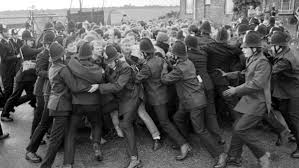
The strike was an enormous event, with the twists and turns of it being covered daily.
I have been on picket lines and seen the terrible violence committed by miners, as well as by the police, when attempts were made to stop (or allow) people to go to work.
I have reported on the awful poverty of striking miners’ families, the devastating effects on South Wales Valleys communities, as well as the suffering of police officers involved, as they were hit by Post Traumatic Stress Disorder (PTSD).

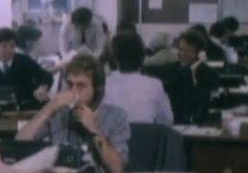
I remember taking a call in the newsroom from an official of the National Union of Mineworkers (NUM) who went on to become a UK Government cabinet minister, advising us of where the flying pickets would be that day.
The miners were fighting for their jobs and their communities, but many of them KNEW their mine was on its last legs.

One of them said to me: “We all realised the pit was exhausted. We’ve been digging up mud for ages!”.
But the media was HATED (particularly the London-based press), and it always seemed strange to me when this hatred was directed towards what I was doing, because I represented a paper that was a long way from London, and a lot of our readership came from valleys communities so we were keenly aware of the issues involved.
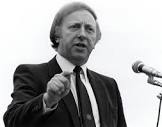
The strike though went on and on (it started officially on March 6 1984), and the fatal flaw for Arthur Scargill (along with the ultimate reason for its failure), was that he didn’t call a national ballot.
I remember a friend of mine saying he covered the strike with miners playing football in the sun, then huddled round a brazier, then in the spring sunshine again.
Three deaths (including one in South Wales) resulted from events related to the strike.
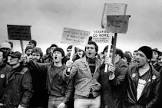
People tend to forget that the strike effectively ended in South Wales.
Until almost the end the strike had been virtually rock solid there, but when miners voted at Porthcawl Pavilion to go back to work (which I also covered) – that was it. It was over.
Many observers and commentators regard it as “the most bitter industrial dispute in British history”.
The journalist Seumas Milne (who became a key adviser to Jeremy Corbyn) said of the strike that “it has no real parallel – in size, duration and impact – anywhere in the world”.
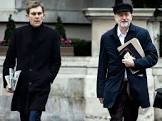
Mr Milne was flat wrong on a lot of things, but right on this.
Older people still remember the split communities, and how women fought to feed their families – but for those younger it’s all just a part of history…
The memories of Phil’s astonishing decades-long award-winning career in journalism (including details of his time on the SWE) as he was gripped by the rare disabling condition Hereditary Spastic Paraplegia (HSP), have been released in a major book ‘A GOOD STORY’. Order it now!

Regrettably publication of another book, however, was refused, because it was to have included names.
As tomorrow marks the day of rigged ‘elections’ in Iran, which does not allow the kind of free investigative journalism that he pursues, Phil will look at the importance of allowing it in support of a functioning democracy.









